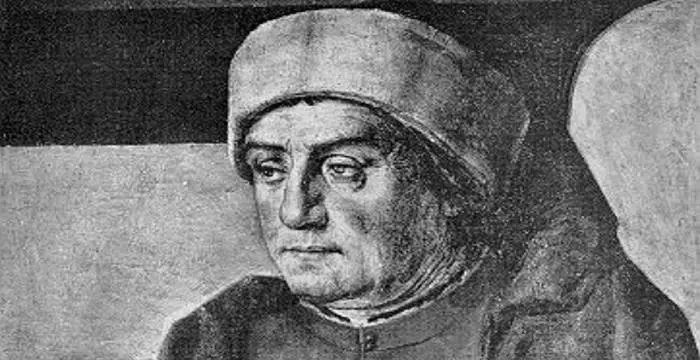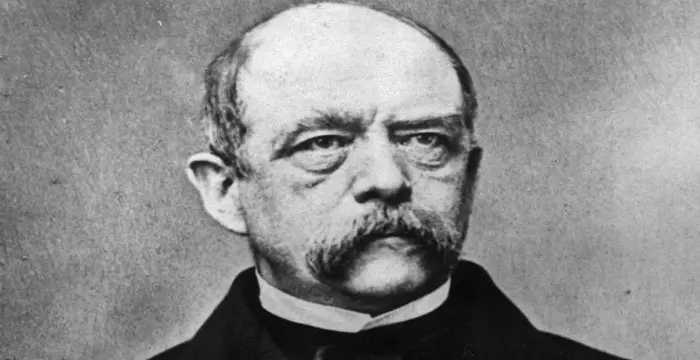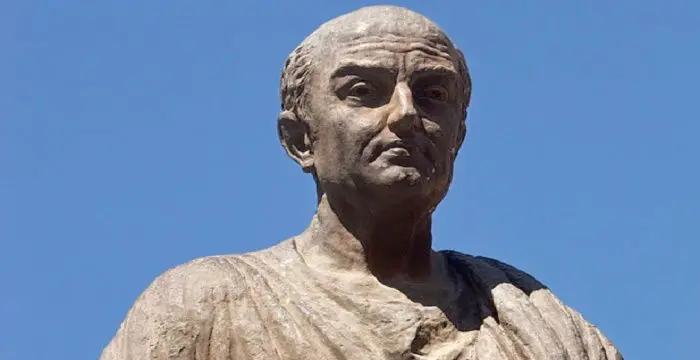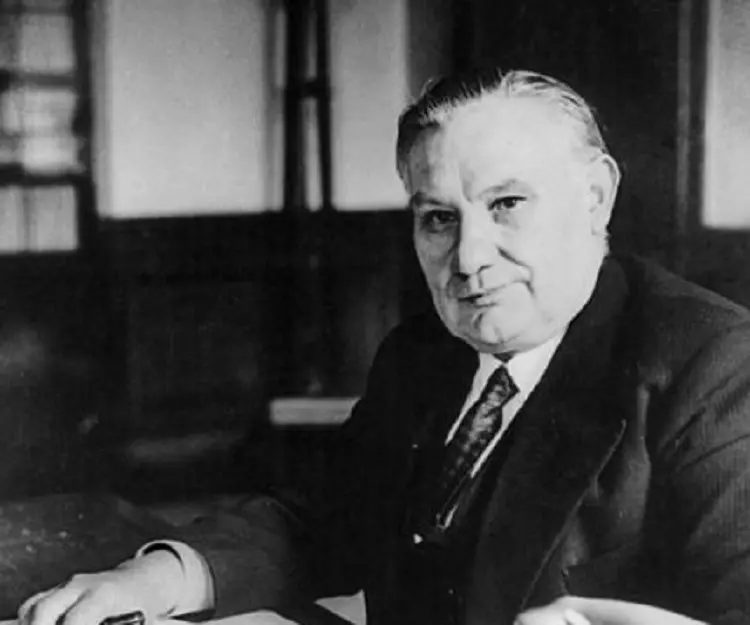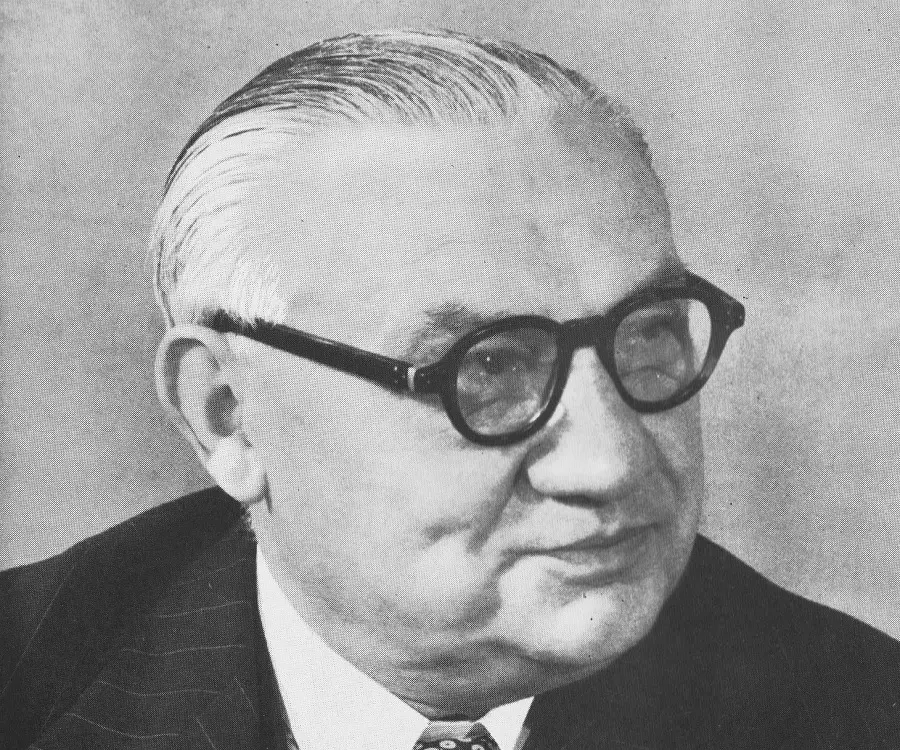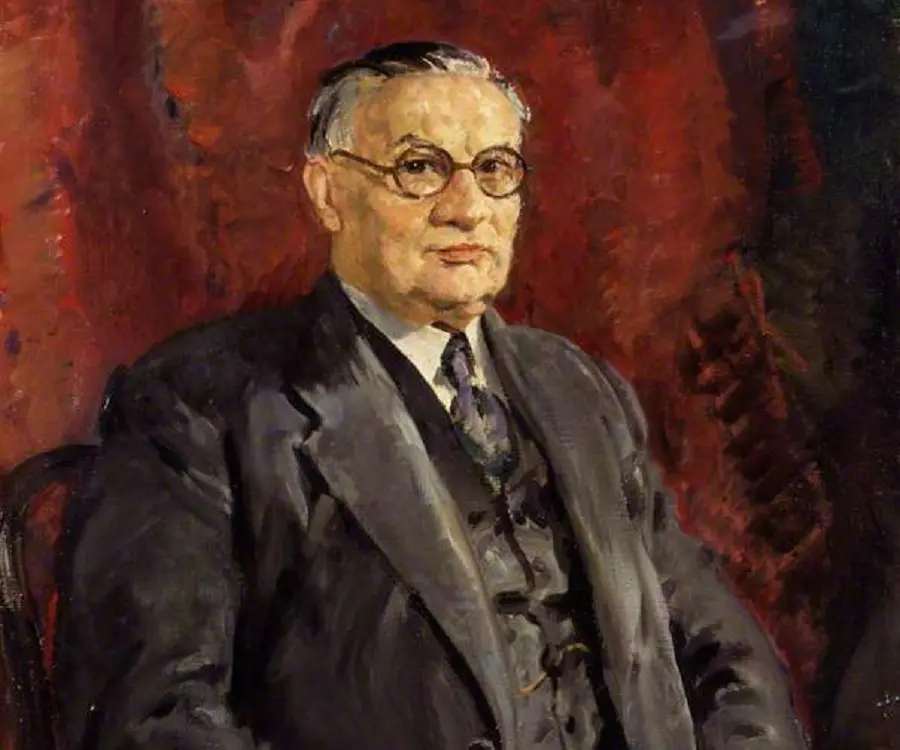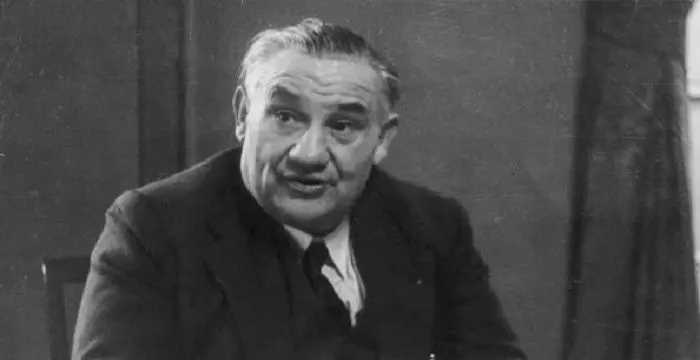
Ernest Bevin - Statesman, Birthday and Personal Life
Ernest Bevin's Personal Details
Ernest Bevin was a British politician and trade union leader
| Information | Detail |
|---|---|
| Birthday | March 9, 1881 |
| Died on | April 14, 1951 |
| Nationality | British |
| Famous | Leaders, Political Leaders, Statesman |
| Birth Place | Winsford, Somerset |
| Political Ideology | Political party - Labour |
| Religion | Baptists |
| Gender | Male |
| Sun Sign | Pisces |
| Born in | Winsford, Somerset |
| Famous as | British statesman |
| Died at Age | 70 |
// Famous Statesman
Anicius Manlius Severinus Boethius
Boethius was an early 6th century Roman senator and philosopher best known for his treatise ‘Consolation of Philosophy’. This biography of Boethius provides detailed information about his childhood, life, achievements, works & timeline.
Otto von Bismarck
Otto von Bismarck served as the Chancellor of Germany and the Prime Minister of Prussia. He unified the German states into a powerful German empire. This biography profiles his childhood, political career, life, achievements and timeline.
Lucius Annaeus Seneca
Lucius Annaeus Seneca, commonly known as Seneca, was a Roman philosopher and statesman. This biography profiles his childhood, life, career, works, achievements & timeline.
Ernest Bevin's photo
Who is Ernest Bevin?
Ernest Bevin was a British politician and trade union leader and a British statesman. A member of the Labour Party, he was one of the founders of the Transport and General Workers’ Union (TGWU) and also held the post of the Union’s general secretary from 1922 to 1940. As foreign secretary in Clement Atlee’s government, he played a key role in shaping British foreign policy in the post World War II era. His childhood was an extremely distressing and unpleasant one as he was orphaned by the age of eight, and had to give up on education in order to fend for himself by working at various places that promised no hopes for the future. At the age of 11 he started working as a labourer and eventually joined the Dockers’ Union. Subsequently he became the secretary of the Dockers’ Union and entered politics through the Bristol Socialist Society. After several defeats in the general elections he finally became a part of the government under the Winston Churchill administration in 1940. He was given the post of Minister for Labour and National Service and he completed his tenure with success. After the Second World War he played an important role in allocating financial and military aids to the government while also creating a better platform from where the trade unions could gain more leverage while negotiating for their terms of agreement
// Famous Leaders
Edi Rama
Edi Rama is the current Prime Minister of Albania. Check out this biography to know about his childhood, life, achievements, works & timeline.
Tecumseh
Tecumseh was a Native American leader of the Shawnee clan. This biography profiles his childhood, life and timeline.
Khalifa bin Zayed Al Nahyan
Sheikh Khalifa bin Zayed Al Nahyan is the current President of the United Arab Emirates (UAE). Check out this biography to know about his birthday, childhood, family life, achievements and fun facts about him.
Childhood & Early Life
Ernest Bevin was born on March 9, 1881 in Somerset, England. His mother’s name was Diana Bevin and there is no account of his father. After the passing away of his mother in 1889, he endured a poverty-stricken childhood.
He attended school only for a brief period and dropped out in 1892.
Career
In 1892 Ernest Bevin worked as a labourer and then as a mineral-water lorry driver in Bristol. He became involved with the Dockers’ Union and was introduced to politics by the Bristol Socialist Society.
From 1910 to 1921 he was the secretary of the Dockers’ Union and from 1914 also adorned the position of a national organizer. He played a very important role in the formation of the Transport and General Workers Union (TGWU) in 1922.
He was soon elected as TGWU’s general secretary, which made him the one of the leading labour leaders in the country and their strong advocate within the Labour Party.
He contested as a Labour Party representative in the general elections of 1918 and 1931, from the constituencies of Bristol Central and Gateshead respectively and lost both times.
During the 1930s he advocated British rearmament and a strong foreign policy and opposed fascism. His accusatory speech targeted at George Lansbury in 1935 led to Lansbury’s resignation and the appointment of Clement Attlee as the Party’s leader.
The passing of the Emergency Powers (Defense) Act in 1939 gave him immense control over the labour forces and strengthened the bargaining position of trade unions for post-war negotiations.
In 1940, Winston Churchill formed a government with an all-party coalition during World War II and named Bevin as the Minister of Labuor and National Service. As Bevin wasn’t an MP, he was elected unopposed to the House of Commons as an MP from the Wandsworth Central constituency.
During the war he got nearly 48,000 military conscripts (Bevin Boys) to work in the coal industry and also arranged for better payment schemes and more hospitable living conditions for the working-class people.
In 1945, Clement Attlee of the Labour Party formed the government and Bevin was named as the Foreign Secretary.
The World War II had left Britain on the verge of bankruptcy and Bevin arranged a low-interest $3.75 billion loan from US. In order to establish Europe as a single military alliance, he signed the Dunkirk Treaty and the Brussels Pact, which paved the way to the formation of NATO in 1949.
In 1946, Attlee and Bevin came under immense criticism for their idea of developing an atomic bomb. The ministers who would have opposed it on the basis of cost were excluded from the final meeting in 1947.
The State of Israel was created in 1948 after the Mandate of Palestine ended. Bevin didn’t handle the situation as well as everybody thought and the partition wasn’t peaceful with hundreds of thousands being displaced.
He negotiated the Portsmouth Treaty in 1948 with Iraq, under which British continued control of Iraqi foreign affairs and Iraq was tied to them for military supplies and training.
He resigned on March 9, 1951 and then became the Lord Privy Seal for a brief period in the same year.
Major Works
Ernest Bevin is credited for co-founding the Transport and General Workers Union and then presiding as the founder General Secretary from 1922 to 1940.
As foreign secretary in Clement Atlee’s government, he played a key role in shaping British foreign policy in the post World War II era. He was instrumental in creation of NATO and in establishing Britain as a staunch ally of the USA in the Cold War era.
Personal Life & Legacy
Not much is known about Ernest Bevin’s personal life except the fact that he was married and had a daughter.
He died on April 14, 1951.
In 2006, some declassified intelligence files revealed that the Jewish terrorist groups plotted to assassinate Ernest Bevin in 1946
// Famous Political Leaders
Edi Rama
Edi Rama is the current Prime Minister of Albania. Check out this biography to know about his childhood, life, achievements, works & timeline.
Khalifa bin Zayed Al Nahyan
Sheikh Khalifa bin Zayed Al Nahyan is the current President of the United Arab Emirates (UAE). Check out this biography to know about his birthday, childhood, family life, achievements and fun facts about him.
Leo Varadkar
Cam Leo Varadkar is the current Taoiseach—the Prime Minister—of the Republic of Ireland. Check out this biography to know about his childhood, family life, achievements and other facts about his life.
Ernest Bevin biography timelines
- // 9th Mar 1881 To 1889Ernest Bevin was born on March 9, 1881 in Somerset, England. His mother’s name was Diana Bevin and there is no account of his father. After the passing away of his mother in 1889, he endured a poverty-stricken childhood.
- // 1892He attended school only for a brief period and dropped out in 1892.
- // 1892In 1892 Ernest Bevin worked as a labourer and then as a mineral-water lorry driver in Bristol. He became involved with the Dockers’ Union and was introduced to politics by the Bristol Socialist Society.
- // 1910 To 1922From 1910 to 1921 he was the secretary of the Dockers’ Union and from 1914 also adorned the position of a national organizer. He played a very important role in the formation of the Transport and General Workers Union (TGWU) in 1922.
- // 1918 To 1931He contested as a Labour Party representative in the general elections of 1918 and 1931, from the constituencies of Bristol Central and Gateshead respectively and lost both times.
- // 1922 To 1940Ernest Bevin is credited for co-founding the Transport and General Workers Union and then presiding as the founder General Secretary from 1922 to 1940.
- // 1935During the 1930s he advocated British rearmament and a strong foreign policy and opposed fascism. His accusatory speech targeted at George Lansbury in 1935 led to Lansbury’s resignation and the appointment of Clement Attlee as the Party’s leader.
- // 1939The passing of the Emergency Powers (Defense) Act in 1939 gave him immense control over the labour forces and strengthened the bargaining position of trade unions for post-war negotiations.
- // 1940In 1940, Winston Churchill formed a government with an all-party coalition during World War II and named Bevin as the Minister of Labuor and National Service. As Bevin wasn’t an MP, he was elected unopposed to the House of Commons as an MP from the Wandsworth Central constituency.
- // 1945In 1945, Clement Attlee of the Labour Party formed the government and Bevin was named as the Foreign Secretary.
- // 1946 To 1947In 1946, Attlee and Bevin came under immense criticism for their idea of developing an atomic bomb. The ministers who would have opposed it on the basis of cost were excluded from the final meeting in 1947.
- // 1946 To 2006In 2006, some declassified intelligence files revealed that the Jewish terrorist groups plotted to assassinate Ernest Bevin in 1946
- // 1948The State of Israel was created in 1948 after the Mandate of Palestine ended. Bevin didn’t handle the situation as well as everybody thought and the partition wasn’t peaceful with hundreds of thousands being displaced.
- // 1948He negotiated the Portsmouth Treaty in 1948 with Iraq, under which British continued control of Iraqi foreign affairs and Iraq was tied to them for military supplies and training.
- // 1949The World War II had left Britain on the verge of bankruptcy and Bevin arranged a low-interest $3.75 billion loan from US. In order to establish Europe as a single military alliance, he signed the Dunkirk Treaty and the Brussels Pact, which paved the way to the formation of NATO in 1949.
- // 9th Mar 1951He resigned on March 9, 1951 and then became the Lord Privy Seal for a brief period in the same year.
- // 14th Apr 1951He died on April 14, 1951.
// Famous Pisces Celebrities peoples
Christine Baumgartner
Christine Baumgartner is an American model and the wife of famous American actor Kevin Costner. Check out this biography to know about her birthday, childhood, family life, achievements and fun facts about her.
Galina Becker
Galina Becker is a former athlete and fitness model from America. Check out this biography to know about her birthday, childhood, family life, achievements and fun facts about her.
Nikkie De Jager
Check out all that you wanted to know about Nikkie De Jager, the famous Dutch Makeup artist; her birthday, her family and personal life, her boyfriends, fun trivia facts and more.
Annie Bakes
Annie Bakes is an American adult model and the ex-wife of Dennis Rodman. Check out this biography to know about her birthday, childhood, family life, achievements and fun facts about her.
Jordyn Jones
Jordyn Jones is an American dancer. Let’s have a look at her family & personal life including age, date of birth, boyfriends, net worth, and fun facts.
Oscar Rosenstroem
Oscar Rosenstroem is a Danish Musical.ly star. Let’s have a look at his family and personal life including age, date of birth, girlfriends, net worth and fun facts.
Ernest Bevin's FAQ
What is Ernest Bevin birthday?
Ernest Bevin was born at 1881-03-09
When was Ernest Bevin died?
Ernest Bevin was died at 1951-04-14
Where was Ernest Bevin died?
Ernest Bevin was died in London
Which age was Ernest Bevin died?
Ernest Bevin was died at age 70
Where is Ernest Bevin's birth place?
Ernest Bevin was born in Winsford, Somerset
What is Ernest Bevin nationalities?
Ernest Bevin's nationalities is British
What is Ernest Bevin's political ideology?
Ernest Bevin's political ideology is Political party - Labour
What is Ernest Bevin's religion?
Ernest Bevin's religion is Baptists
What is Ernest Bevin's sun sign?
Ernest Bevin is Pisces
How famous is Ernest Bevin?
Ernest Bevin is famouse as British statesman
